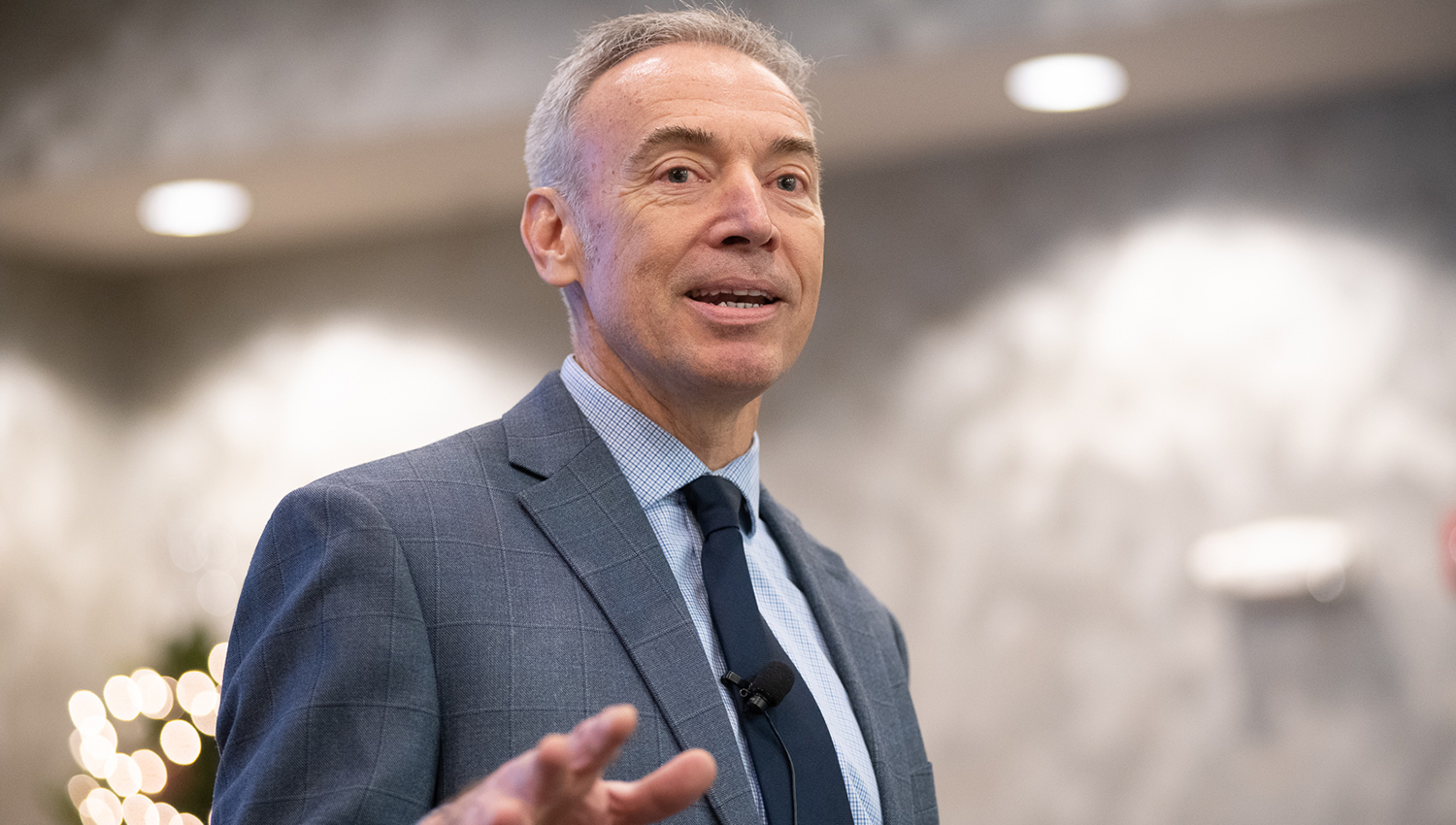
Steve Censky, U.S. Department of Agriculture Deputy Secretary told attendees of the Ag Outlook Forum in Kansas City that he expects China to follow-through with purchase commitments in the phase 1 agreement. (Photo: Joseph L. Murphy/Iowa Soybean Association)
Deputy secretary optimistic about ag outlook
October 1, 2020 | Bethany Baratta
By Bethany Baratta, ISA senior writer
American agriculture has weathered its share of storms these past few years including trade retaliation and effects of the COVID-19 global pandemic.
Despite that, Steve Censky, deputy secretary for the U.S. Department of Agriculture (USDA), says he’s optimistic about the future of agriculture.
His optimism is due in part to the projection of increased ag exports, forecasted to reach $140.5 billion in FY 2021. The USDA projects soybean exports to grow $4.2 billion from FY 2020 to $20.4 billion as a result of expected strong demand from China and expected reduced competition from Brazil, the report says.
An expected follow-through in purchase commitments through the phase 1 agreement between China and the United States is another reason to be optimistic, Censky said.
“The agreement addressed a number of long-standing barriers that existed for years—some over a decade,” Censky said from the podium at the Ag Outlook Forum in Kansas City recently. The event was co-hosted by Agri-Pulse and the Agricultural Business Council of Kansas City.
He said the agreement addresses a number of barriers to biotech approval, use of growth promotants and the slow approach to approving U.S. export facilities.
Recent sales to China have shown China’s commitment to following through on their end of the agreement, but Censky says China must keep the “pedal to the metal” in meeting the ag purchase commitments outlined in the agreement.
The United States-Japan free trade agreement, which entered into force on Jan. 1, 2020, was a win for agriculture.. The Japan free trade agreement means more than 90% of U.S. food and agricultural products imported into Japan will either be duty free or receive preferential tariff access.
It’s a good market for U.S. soy, too. Nearly 75% of Japan’s soybean imports in 2018-19 came from the United States.
The U.S.-Mexico-Canada Agreement (USMCA) addresses long-standing market access challenges and builds upon the successes under the North American Free Trade Agreement (NAFTA), Censky said. The agreement maintains zero tariffs on U.S. soybeans and offers a pathway to continued industry growth.
Censky said the government has been supportive of farmers and ranchers in response to the coronavirus pandemic, rolling out Coronavirus Food Assistance Programs 1 and 2, for example.
U.S. farmers and ranchers are some of the ‘most productive, most innovative’ groups in the world, Censky said. Over the last 90 years, U.S. farmers and ranchers have increased productivity by more than 400%. But they shouldn’t stop, he said. A growing world population and rising incomes will require more food and feed. A changing climate, he says, will require innovation as weather and pest cycles will present challenges.
The USDA’s Ag Innovation agenda, with its goal to increase ag production by 40% and cut its footprint in half by 2050, will require innovation and technology.
This vision to becoming more sustainable is similar to the European Union’s Farm to Fork strategy, but that’s where the comparison stops, Censky said.
“Under the U.S. approach, we want to welcome and we want to bring on innovation and new technologies. In the EU, their strategy is about taking technologies away from farmers and about taking crop-protection products away from farmers and taking animal therapy drugs away from farmers,” Censky said. “And we really think that's going to have disastrous results.”
Censky will be leaving his post at USDA next month. From there, he’ll return to the American Soybean Association (ASA) as CEO, a post he held for 21 years prior to his 3-year tenure at USDA. Part of his responsibilities will be leading the organization’s search for a permanent CEO, according to ASA.
“I look forward to making this optimistic outlook that I have a reality,” he said.
Contact Bethany Baratta at bbaratta@iasoybeans.com.
Back